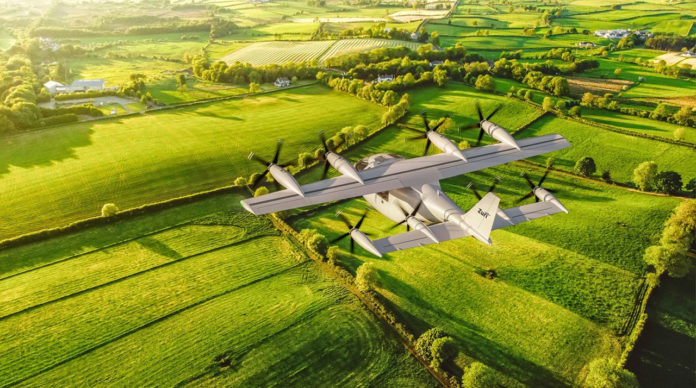Zuri – a startup based in Prague, the Czech Republic – has presented its next-generation hybrid VTOL aircraft. The company is creating two versions – Zuri 2.0 for the passenger air taxi and Zuri 2.0 Cargo for the cargo transport model.
The Zuri aircraft has a wingspan of up to 13 meters (43 feet). The eVTOL claims to offer a range of more than 435 miles (700 km) and a cruising speed of over 186 mph (300 km/h) while also being nearly silent and able to land in tight spaces. The mix between traditional engines and electric thrust, therefore, seems to be winning in terms of autonomy and comfort.
The aircraft will be powered by eight tilting electric motors and will have an onboard turbine generator for powering electric motors and recharging lithium batteries. It has four propellers in the front and four in the back, plus several independent battery boxes.
The passenger version will be able to carry four to five people, including the pilot. Meanwhile, the cargo delivery aircraft is expected to have a maximum payload of 300 kg. The Zuri aircraft claims to have a sophisticated autopilot using data from multiple inputs, including traffic and terrain, for a safe flight. In addition to the fly-by-fly-wire system with a mechanical backup for airplane control surfaces, the VTOL is also equipped with sensors and AI algorithms for computerized vision and object recognition.
The new generation hybrid-electric VTOL aircraft comes after more than three years of developing and ground testing its technological demonstrator. Towards the end of 2021, the Czech hybrid VTOL successfully carried out the first hover test using a technology demonstrator. Both the passenger and cargo versions of Zuri 2.0 are gearing up to take regional air mobility to a new level.
In addition, Zuri is looking to certify the aircraft with the European Union Aviation Safety Agency (EASA) and is currently supervised by its local authority. It also has plans to obtain certification from the U.S. Federal Aviation Administration in the future.
